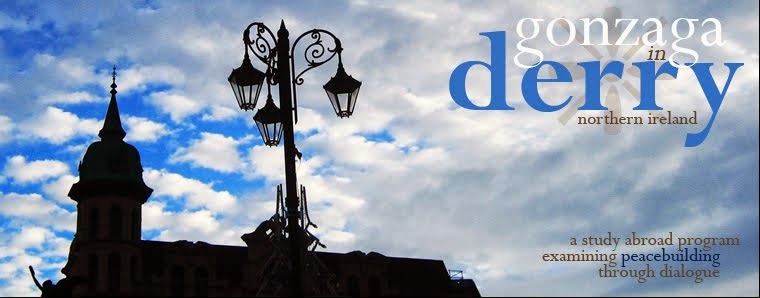 By: Kathryn Vernon
By: Kathryn VernonFrom Derry to Belfast – two so totally different cities – one with one hundred ten thousand souls and the other with one million one hundred thousand souls – one known for Civil Rights Marches and Bloody Sunday and the other the seat of government for Northern Ireland but also the home of the Shankhill Road bombings. Two cities, both with civic pride and determination, and home to murals and tributes to those killed in the Troubles.
It has been an enlightening trip – overwhelming in its history, culture, and pain – but full of people happy to tell their stories and welcome you to their homeland. I had the opportunity to meet up with my friend David, who works in Belfast, and talk to him about events that have occurred in the last five years since we were in class together. After catching up on our respective lives, we talked about the latest round of talks led by Richard Haas and Megan O’Sullivan and the fact that they had left before any agreements were reached.
David's point of view is very calm and measured, having been in the government all of his adult life. He worked with David Trimble in the lead up to the 1998 Belfast or Good Friday Agreement and works now on ensuring each step of the enduring peace process is instituted thoughtfully and with the good of the people of Northern Ireland in mind. As is usually the case when David and I get together, I learned about the peace process and why it is not as easy as many of us seem to think it should be to achieve. When we Americans ask why it takes so long - because, for heaven's sake, it has been fifteen years - we don't think about the deep divisions, the pain and suffering, the hatred that must be overcome. That is why it is called a process - where pain must be acknowledged and smart people must figure out how to accommodate the multitude of needs of people who have lost family members.
David is the person who first introduced me to the Troubles in Northern Ireland and explained they weren't simply about religion - they were about rights, property, ownership, civil rights, identity. Much more complicated than many of us understand. This round of talks was about flags (the displaying of), parades (who can march and where), and the past (reparations, justice, acknowledgement). Although the two chief mediators have left without the two parties (Nationalists and Unionists) agreeing to anything, a report has been left with suggested steps and committees spelled out. Some think there may be the ability within the government and the parties in Belfast to move on some of those steps and committees - that the people in Northern Ireland can take the necessary steps on their own toward healing and reconciliation of these tough and enduring issues. Or this could be political posturing by the parties on the eve of elections in 2014 (in the EU), 2015 (in the UK), and 2016 (w/n Northern Ireland).
One reason it is so difficult to get consensus within the parties is that under the umbrella of the Nationalists and Unionists are socialists, conservatives, Marxists - every type of political and social persuasion - one with the bent of a united, independent Ireland and the other of a Northern Ireland continuing as part of the UK. And we thought US politics was complicated!
I can't decide if I prefer Derry over Belfast - in fairness, one half-day spent in Belfast is not nearly long enough to know what it is like - but I do like the walkability of Derry - I can cross the Peace Bridge and visit the Ebrington Barracks for the Turner Prize exhibition - or walk to a myriad of local pubs within and outside the walls of the Old City - or simply walk the wall and look out at the picturesque countryside or the murals of Bogside. Perhaps next time I need to spend ten days, or more, in Belfast and learn its unique history and its role in the peace building events and process. In the meantime, I'll just enjoy a cider or a spot of tea and listen to the brogue of the people of Derry for the next few days. They do make me feel at home.

No comments:
Post a Comment